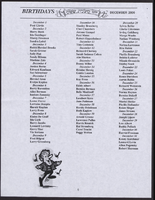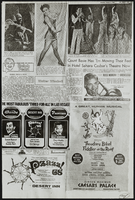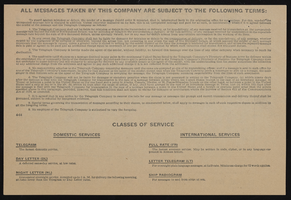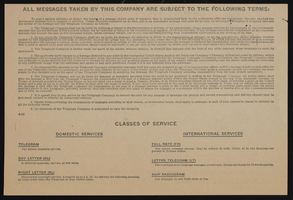Search the Special Collections and Archives Portal
Search Results

Gene Noboru Nakanishi oral history interview: transcript
Date
Archival Collection
Description
Oral history interview with Gene Noboru Nakanishi conducted by Ayrton Yamaguchi, Cecilia Winchell, and Stefani Evans on April 2, 2021 for Reflections: The Las Vegas Asian American and Pacific Islander Oral History Project. Gene Nakanishi shares his detailed family history from both his father's and his mother's families. He discusses his paternal grandfather's work on the Union Pacific Railroad, the family's internment in Wyoming during World War II, and his father's release from the camp by joining the United States Army Signal Corps. Nakanishi also talks of his maternal grandfather who was of the Bushido ("warrior") class in Osaka, Japan, and his grandfather's work with Christian missionaries. He shares details of his mother's restaurant employment in Los Angeles and her opening of Osaka Japanese Bistro in Las Vegas in 1969. Nakanishi also talks about being born and raised in Las Vegas, his musical schooling at Berklee College of Music in Boston, and his graduate education at Harvard University. He discusses his work as a band teacher for the Clark County School District, his involvement in the Idyllwild Arts Summer Program band camp, and his interests in jazz music.
Text
Selena Torres (Nevada Legislature, Assemblywoman) oral history interview conducted by Magdalena Martinez: transcript
Date
Archival Collection
Description
From the Lincy Institute "Perspectives from the COVID-19 Pandemic" Oral History Project (MS-01178) -- Elected official interviews file.
Text
Steve Sisolak (Nevada Governor) oral history interview conducted by Magdalena Martinez: transcript
Date
Archival Collection
Description
From the Lincy Institute "Perspectives from the COVID-19 Pandemic" Oral History Project (MS-01178) -- Elected official interviews file.
Text

Transcript of interview with Cathie Millson by Anna Huddleston, June 10, 2014
Date
Archival Collection
Description
Cathie and Chris Millson moved to Las Vegas with their one-year-old daughter, Nicole, in 1984 following Chris’s completion of a cardio-thoracic anesthesiology fellowship in Atlanta, Georgia. Their two other children were born in Las Vegas. Shortly after they arrived they purchased the Rancho Bel Air house where they currently reside. Cathie talks about raising her children and living in Rancho Bel Air, a gated neighborhood of custom houses, which grew to maturity after the Millsons moved in. Cathie’s memories chronicle the growth of Las Vegas from small town to large city, how a certain segment of the population lived and entertained, and how downtown revitalization has brought young people back to Rancho Bel Air to raise their families.
Text

Transcript of interview with Walter John Ritzau by Elizabeth Garrison, February 25, 1977
Date
Archival Collection
Description
On February 25, 1977, Walter John Ritzau interviewed Elizabeth Schneehagen Garrison (born 1943 in Las Vegas, Nevada) about her life in Southern Nevada. Garrison first talks about her schooling in Las Vegas and her first homes in Las Vegas. She also discusses the atomic testing, the Devils Hole in Ash Meadows, early church involvement, recreational activities, and some of the environmental aspects of Las Vegas. Garrison later describes her work for the Central Telephone Company before describing the Helldorado parade and some of the early activities designed for children. In the latter part of the interview, she describes her father’s garden, the changes in the city environment and building, shopping locations, and more about her home life.
Text
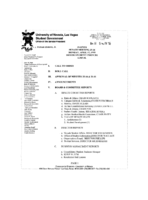
Meeting minutes for Consolidated Student Senate University of Nevada, Las Vegas, April 17, 1995
Date
Archival Collection
Description
Text

